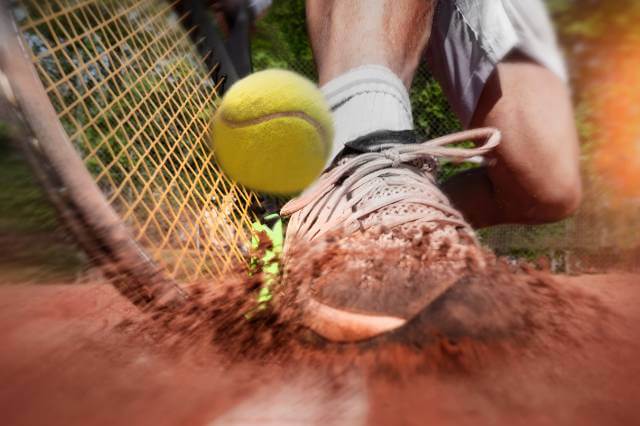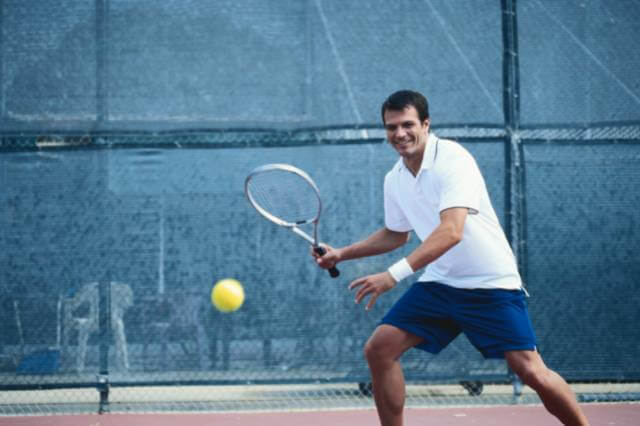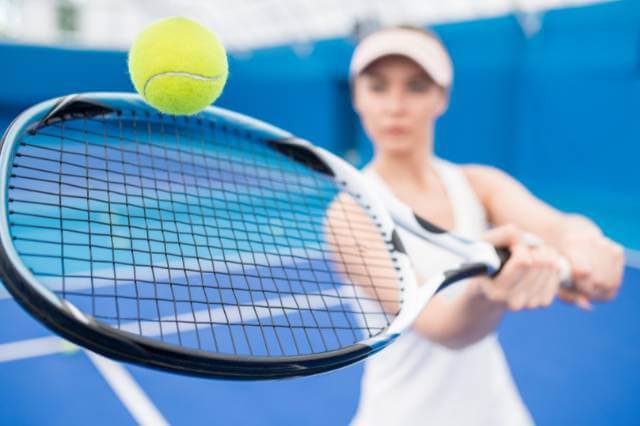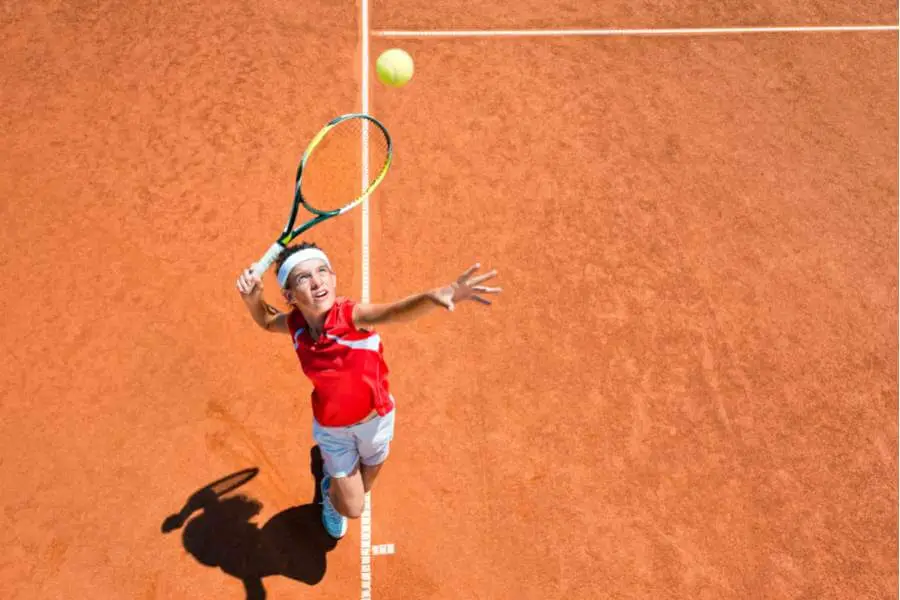Tennis players may realize that their strokes aren’t landing as hard as they used to due to their racket’s weight.
What are the signs that your racket is too heavy? For competitive play, how much should a tennis racquet weigh?
All of these queries are worthwhile.
Table of Contents
Is My Tennis Racket Too Heavy?
Tennis rackets should be used in a few matches while being observed for performance in order to evaluate whether they are overly heavy.
Many players may just need to change their strokes to accommodate the heavier racket.
Players may need to select a lighter racket in other circumstances.
We’ll go over everything you need to know if you’re concerned that your tennis racket could be too hefty for you.
After examining how tennis players may determine whether their racket is too heavy for them, we’ll examine how to get used to heavier tennis rackets, the reasons why many professional players choose heavy rackets, and how to select the optimal racket for your level of talent.
Your performance on the court is impacted by the weight of your tennis racket. In essence, a racket’s weight is strongly related to factors like speed, impact, and mobility.
Of course, this is one of the reasons that tennis players are recommended to practice with and compete with a certain weight class and kind of racket.
A tennis player’s performance can be adversely affected by even minor variations in a racket’s weight.
The aforementioned aspects, including speed and maneuverability, will be impacted by using a racket that is heavier or lighter than your standard one.
Your total performance will be much improved if you stick to a specific weight class and racket type.

However, a lot of tennis players pick the wrong weight division.
Over time, using a tennis racket that is overly light or heavy will reduce your performance.
Of course, one way to prevent this is to make sure your tennis racket isn’t too heavy for you. But how?
Tennis players should ultimately play a few games with their racket to see if it is too heavy for them to use.
If a player wants to determine if their racket is too heavy for them, they should play between 3 and 5 matches with it.
You can alter the number of matches you play with the racket if you typically play less or more than this.
You’ll be able to tell if your racket is too heavy for you once you’ve finished these matches.
Your tennis racket is probably the right weight for you if you finished these matches without feeling too worn out.
After three to five matches with the hefty racket, how does your arm feel?
You can bear the weight of the racket if your arm does not feel fatigued.
However, there are certain warning indicators to watch out for if a racket is too heavy for you.
Every tennis player has to make sure they can swing their racket effortlessly and comfortably.
You can make comfortable swings while utilizing a racket in the right weight class for your needs.
However, it will be more difficult to swing your racket if it is excessively heavy.
Players won’t be able to use their shoulders’ entire range of motion while swinging a racket that is overly heavy.
Instead of contributing their body weight and legs to the game, players with extremely heavy rackets would overuse their arms.
A racket that is excessively heavy for you may therefore impact your timing during games.
A player’s game will ultimately be slowed down by a racket that is too heavy for them.
With a certain racket, if you frequently miss shots, it’s probably because it weighs too much.
If after using a given racket for a few matches you noticed that your arm was fatigued, the racket is too heavy for you.
A racket that is excessively heavy for you might hurt your wrist and shoulder in addition to affecting how well you play on the court.
A racket in the right weight class won’t make your arm feel overly fatigued after a few matches, as we already explained.
The strength of their wrist and shoulder muscles should be taken into account when determining if a racket is too hefty for them.
A lighter racket would be suggested for people with weak muscle tone in these regions.
You probably need a lighter racket if you experienced any of these symptoms while playing with a heavy racket.
There is another factor for you to think about, too, before you spend a lot of money on a new racket. Of course, that is how you work.
New rackets frequently seem overly heavy for players, however, this isn’t always the case.
You want to tweak your technique and play a few more matches before transitioning to a lighter racket.
You could discover that your racket isn’t actually that hefty.

Can a Tennis Racquet Have Too Much Weight?
Yes. When striking from a distance on the court, if it requires all of your energy to swing the racket, your racket is excessively heavy.
Using a racket that is overly heavy will negatively affect your game. For this reason, novices should never use heavy rackets.
In general, most players don’t utilize very heavy racquets, as I already indicated.
Why should you, then? There is no justification for using a heavy racket unless you’re already quite fit and capable of lifting large objects.
A hefty racquet will slow down your game and cause you to miss more strokes if you can’t swing it freely and comfortably.
An injury to the wrist or shoulder might result from using a heavy tennis racquet.
This can be a problem if you don’t have good muscle tone in certain places.
However, your playing style, skill level, and physical strength should truly determine the weight of your racket.
Finding the right racket weight for you requires some experimentation with various weights.
How Tired Are You After All That?
Playing with a heavy racket might help you develop endurance so you can play continuously for long periods of time.
You could notice that your arm tires more rapidly when you initially start using a heavier racket.
However, you will develop endurance as you play with the heavier racket and be able to play for extended periods of time without becoming fatigued.
Consider switching to a lighter racquet if, after many bouts, you still feel exhausted.
You may develop the stamina necessary to play for extended periods of time by using a hefty racket.

You Are Affected by Timing
It’s possible that your timing is off if you find it difficult to swing your racket quickly enough all the time.
Using a racquet that is too heavy for you might contribute to this by slowing down your swing.
Delay in timing can also be caused by poor posture and grip.
Your method has to be improved if you want to fix this problem.
Make sure your racket is appropriate for your strength and degree of expertise to begin with.
At the start, work on perfecting your form by practicing your swings slowly.
You should be able to improve your timing and game with time and practice.
How Does Racquet Weight Affect Your Timing?
It is generally acknowledged that a heavier tennis racket may enable a player to produce greater force behind their strokes.
The impact that racket weight may have on a player’s timing, however, is frequently ignored.
While generating power may be simpler with a larger racket, timing your swings may become more challenging.
Tennis requires precise timing in order to win.
Players must perfectly time the swing of their racket to make appropriate contact with the ball and strike it with the desired amount of force.
Recent research, however, raises the possibility that racket weight may affect players’ ability to pace their strokes.
It might be more challenging to swing lighter racquets fast and precisely, which can result in mistimed strokes and eventually lost points.
Some players might be able to overcome the difficulties presented by a heavier racket, but for many, having a lighter one could be a big benefit.
In the end, it will be up to each player to decide whether or not racket weight has an impact on time.
Every shot has so much weight that even a slight edge might make all the difference.
This is due to the fact that a heavier racket can cause timing and rhythm issues since it takes more effort to accelerate and decelerate.
Because of this, players that use heavy rackets could discover that they hit their strokes early or late, which reduces their power and accuracy.
However, these time concerns may be resolved with practice and the right technique, allowing you to benefit from the extra weight.
You may improve the strength and precision required to compete with the world’s top players by strengthening your wrists and learning to make larger motions with your racket.

FAQs
Why Do Professionals Use Heavy Racquets?
Tennis pros prefer heavy rackets because they offer more stability and power. A heavier racket also makes it simpler to create spin.
You may hit more powerful serves with a heavier tennis racket and with less effort.
Professional players can hit the ball with such force that they don’t need to swing their racquets at ridiculously high speeds.
More of the impact power will be dampened by a heavier tennis racket.
According to some players, this lessens the shock that is applied to their arms.
A 300G Tennis Racket—Is That Too Much?
A racket should typically weigh 300 grams (or 10.6 ounces).
A racket for an intermediate male should weigh between 295g and 315g, while one for an intermediate lady should weigh between 280g and 300g.
What Advantages Does a Heavy Racket Have?
More power and stability are provided with a heavier racket.
A heavier racket also makes it simpler to create spin.
You may hit stronger serves with less effort while using a heavier tennis racket.
More of the impact power will be dampened by a heavier tennis racket. According to some players, this lessens the shock that is applied to your arm.
A hefty racket can be ideal for you if you’re a player who desires additional strength and stability.
But remember that a heavier racket could be trickier to handle.
It is essential to test out various rackets if you are undecided to discover which one suits you the most.
Final Thoughts
Tennis players just starting out should use light rackets with a head-heavy balance.
They’ll have access to easy power as a result, allowing them to concentrate on utilizing the proper technique rather than smacking the ball hard.
Intermediate players may choose to transition to a medium-weight racked with an equal balance as they continue to advance.
With sufficient power and this time a little more control, these rackets will offer a solid overall balance.
Players will gain confidence in their own abilities thanks to this.
Last but not least, experienced tennis players would probably choose hefty rackets with a head-light balance.
High-level players must be able to create power on their own while maintaining excellent control and mobility.
Related:

